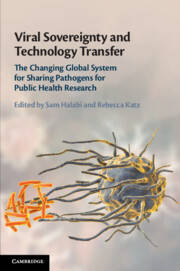 Viral Sovereignty and Technology Transfer
Viral Sovereignty and Technology Transfer from Part II - Health Security, Research Ethics, and Human Rights Implications
Published online by Cambridge University Press: 15 May 2020
Chapter 4 explores the implications of Chapters 1, 2, and 3 for genomic research specifically. Increasingly, it is not only the biological samples of human pathogens that are vital for development of medicines, diagnostics, and vaccines, but genetic sequencing data (GSD). While obtaining GSD used to be slow and costly, it is now fast and declining rapidly in price. The effect of these trends are to make more genetic information available, about more people, in more parts of the world. While this problem was long anticipated and prepared for in richer countries – e.g. the Genetic Information Nondiscrimination Act in the U.S. – there is little or no infrastructure for managing genetic findings in many low- and middle-income countries. Ben Berkman, faculty at the National Institutes’ of Health Office of Bioethics, and Haley Sullivan, at the Duke Margolis Center for Health Policy, survey the risks to research participants and the ethical and practical obligations of researchers to protect genetic information in low- and middle-income countries.
To save this book to your Kindle, first ensure [email protected] is added to your Approved Personal Document E-mail List under your Personal Document Settings on the Manage Your Content and Devices page of your Amazon account. Then enter the ‘name’ part of your Kindle email address below. Find out more about saving to your Kindle.
Note you can select to save to either the @free.kindle.com or @kindle.com variations. ‘@free.kindle.com’ emails are free but can only be saved to your device when it is connected to wi-fi. ‘@kindle.com’ emails can be delivered even when you are not connected to wi-fi, but note that service fees apply.
Find out more about the Kindle Personal Document Service.
To save content items to your account, please confirm that you agree to abide by our usage policies. If this is the first time you use this feature, you will be asked to authorise Cambridge Core to connect with your account. Find out more about saving content to Dropbox.
To save content items to your account, please confirm that you agree to abide by our usage policies. If this is the first time you use this feature, you will be asked to authorise Cambridge Core to connect with your account. Find out more about saving content to Google Drive.